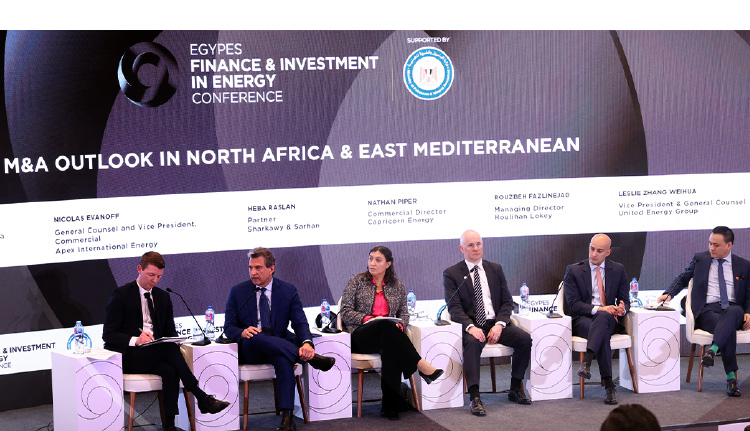The latest iteration of the EGYPES Finance and Investment in Energy Conference once again brought together energy leaders, sustainable finance experts, and climate specialists to examine the economic uncertainties confronting global economies and explore how financial mechanisms and capital market tools can facilitate the development of future energy systems.
The conference kicked off with a focus on Industrialization and Localization Policies for Egypt’s Clean Energy Transition. During this session, participants shed light on Egypt’s recently unveiled objectives to attain 42% of its energy from renewable sources by 2030, aligning with its updated Nationally Determined Contributions Plan. Subsequent panels delved into diverse topics, including investment in carbon capture, strategies for scaling up green hydrogen production, financing pathways toward achieving net-zero emissions by 2050, and methods for bridging the financing gap in energy efficiency initiatives.
A panel that delved into Creating and Investing in a Carbon Capture Roadmap, drew insights and ideas from notable figures such as Alaa El Batal, Chairman at Egyptian General Petroleum Corporation (EGPC); Nicolas Katcharov, Chief Executive Officer at Energean International; Youssef Salem, Chief Financial Officer at ADNOC Drilling; Nikiforos Bantoukoudis, Chief Financial Officer at HELLENiQ Upstream; Giorgi Bibineishvili, Head of Upstream at Georgian Oil and Gas Corporation; Mohammad Abu Zahra, Head of Middle East and North Africa at Global CCS Institute; and Ahmed Mokhar Vice Chairman & Managing Director at NBK Capital Asset Management Egypt as the moderator of the panel.
After years on the periphery, carbon capture is now emerging as a multi-billion-dollar industry, with investments surpassing $6 billion in 2023. As nations and organizations commit to net zero emissions, carbon capture has become integral to national decarbonization strategies.
Experts and policymakers recognize the vital role of CCUS in climate change mitigation, emphasizing the need for a 120-fold increase in CCUS use by 2050 to meet global net-zero targets. The ongoing progress in CCS technology, coupled with growing investment and supportive policies, is essential for widespread adoption.
During the panel, Bantoukoudis highlighted the growing significance of addressing the deficit storage in demand and supply within the European region. He underscored the strength of Egypt’s energy sector and stressed the necessity of imposing restrictions on the transportation of CO2.
Moreover, Bibineishvili pointed out the need for Georgia to increase its hydrocarbon energy production, drawing parallels with other developed nations. He highlighted Egypt as a positive model for Georgia’s energy transition, advocating for the emulation of Egypt’s successful energy strategies.
In addition, Abu Zahra shed light on other nations, like the United States of America, as a leading example in employing advanced techniques for carbon capture and storage projects (CCS), stating, “These are incitive models to push forward the energy transition worldwide.”
Furthermore, El Batal responded to Abu Zahra’s remarks, stating, “From my perspective, CCS projects pose a significant economic challenge, but we can begin addressing this challenge with the support of Research and Development initiatives (R&D) in every country. This presents an opportune moment to leverage all available technologies to overcome this economic hurdle.”
Also, Salem commented, “Addressing the insights shared by Alaa and Abu Zahra on project-level economics, I emphasize the significance of the corporate level in attracting suitable investors to the sector. This approach will secure a substantial level of investment, consequently fostering the sector’s overall growth.”
Another panel discussion tackled an interesting argument about “Allocating a Trillion Dollars Globally to Achieve net zero by 2050”.
By shifting gears to this topic, it is noteworthy that global investments in energy transition technologies hit a record of $1.3 trillion in 2022, yearly spending on the 1.5°C pathway must reach $6.9 trillion by 2030, amounting to nearly $200 trillion in global investments to zero out the world’s greenhouse gas emissions by 2050 and stop global warming.
The participants in this session were Scott Gale, Executive Director at Halliburton Labs; Norinao Sato, Senior Executive Vice President Middle East & Africa at Yokogawa; Anass Joundy, Associate Director, Natural Resources, South and East Med at the European Bank for Reconstruction and Development (EBRD), Zoe Knight, Group Head, Centre of Sustainable Finance, Head of Climate Change MENAT at HSBC; and Steve Lutes, Vice President of Middle East Affairs at the US Chamber of Commerce as the moderator of this panel.
Knight initiated the discussion by addressing the substantial financing challenge, highlighting an exercise conducted in HSBC to potentially overcome this obstacle. This involved assessing the investment needs across the 60+ countries in which the bank operates, aiming to determine the required investment amount.
Moreover, Sato articulated the need for upcoming energy production to address CO2 emissions, emphasizing the importance of considering emissions and their potential benefits in the global energy transition initiative using all our power and advanced technologies.
Joundy said, “I believe that we are going through an outstanding challenge because it is a difficult time in the private sector; we face many challenges, not only the logistics part but also the economic investment part.”
Lastly, Gale began by citing a well-known quote, “The future is here but is not evenly distributed,” underscoring the existence of technologies to advance the energy transition. He emphasized the substantial investment required for widespread distribution, stressing the significance of closely examining research papers addressing this issue, as they could influence our lives for years to come.
As usual, the EGYPES Finance and Investment in Energy Conference served as a crucial platform for fostering dialogue and collaboration among key stakeholders in the energy, finance, and climate sectors. As demonstrated by the insightful discussions and diverse perspectives shared throughout the event, the challenges and opportunities in advancing towards a sustainable energy future are multifaceted and require collective action.








